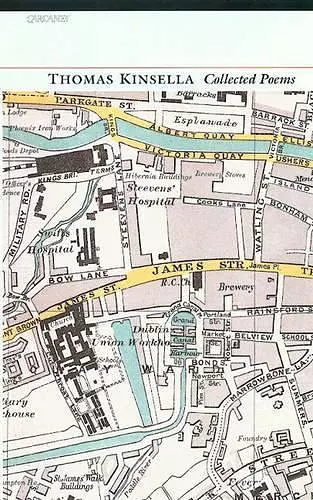Collected Poems
Format:Paperback
Publisher:Carcanet Press Ltd
Published:25th Oct '01
Should be back in stock very soon

Thomas Kinsella stands apart in modern Irish poetry. His work, employing traditional and modernist elements in individual poems and open sequences, deals in a range of subjects from the most intense and psychic privacy to political satire and social commentary, from love and the enabling feminine to metaphysical speculation in a variety of earthly settings. Kinsella is a city poet. Born in Dublin in 1928, he attended University College, and entered the Irish Civil Service, but resigned from the Department of Finance in 1965 for a career in poetry in the United States. He published from the beginning with the Dolmen Press, later co-publishing his poetry and translations with Oxford University Press. His translations from the Irish include the Iron-Age prose epic "The Tain" and "Poems of the Dispossessed: 1600-1900". He is editor of the "New Oxford Book of Irish Verse".
John Greening, Times Literary Supplement, 6th September 2002
Jibes at the Jibers
There are few more puzzling cases in contemporary poetry than that of Thomas Kinsella. Thirty years ago he was considered the most important living Irish poet and had a considerable popular following. But then he changed direction, abandoning the formal style he had mastered in Downstream (1962) and Nightwalker and Other Poems (1968), to produce much tougher work in a more obviously modernist style. The shift is marked in this updating of the 1996 Collected Poems by the transitional Phoenix Park which begins "One stays or leaves. The one who returns is not/m The one, etc etc. And we are leaving", and leads into New Poems (1973), lower-case, mi-sentence "hesitate, cease to exist, glitter again"- and a whole new aesthetic.
The determination to "make it new", with a consequent bleak, willed quality in the writing, is reminiscent of the fate of certain twentieth century composers who converted to serialism (Aaron Copland, for instance). It is hard not to regret the loos of lyricism, richness and ease, although in fact Kinsella never quite forgets this quality, particularly when he is evoking his childhood, or patrolling the streets of Dublin. Dennis O'Driscoll (in Troubled Thoughts, Majestic Dreams, which includes one of best accounts of the poet's work to date) makes a surprising case for Kinsella as a witty poet, whose "tonal quality" provides the key to understanding. Less patient readers might respond more readily to a word Kinsella himself ised about his work: "ordeal". Yet it is worth persevering through the unattributed quotations, the elisions, the narrative ambiguities. The significance of the later books is often deeply buried, and will probably never be wholly clear, but they feel special; one wants to return to them. And for every tussle with the anima or plunge into the abstract murk of the individuating self, there is a plain local memory or a stroll through the city.
Some of the finest work here cannot be classified as characteristically "early" or "late", but all those elements which move or trouble Kinsella find their natural place. So in The Route of The Tain, his extensive researches into folk-material (see his New Oxford Book of Irish Verse), the potency of a landscape and the presence of friends blends into something fresh, overwhelm the poem; the synchronicity of a fox that shows just what these middle-aged men were looking for is lightly handled, with a shrug:
For a heartbeat, in alien certainty
we exchanged looks. We should have known it by now
-the process, the whole tedious enabling ritual.
Such communal moments are touching, since Kinsella is less a poet of the people than of place; specifically- asd the map on the cover of Carcanet's edition would suggest- of Dublin, "this place/ where, it occurs to me,/ I never want to be anywhere else". His people tend to be mythologized into archetypes. Yet the flesh-and -blood Civil Servant, the Son, the Husband and the Eminent Poet do have their say, sometimes quite savagely and unexpectedly, as in the Swiftian account of Literary Dublin, Open Court (1991):
Truth that ne'er obeyed the call
of witty intellectual
the tragic thing that shames the jiber
and monthly magazine subscriber.
But at best, Kinsella is looking wisely at the world as it happens, as the Hen Woman's egg drops: "Through what seemed a whole year it fell/ -as it still falls, for me." Such observations pull him once more into the present tense, which he largely abandoned with his formalism. Too many of the later poems are hobbled by a refusal to find immediacy in the verbs, resulting in a drab narrative. Generally, however, the perambulatory pieces are models of their Augustan kind, from A Country Walk through Nightwalker to The Pen Shop of 1997.
The Pen Shop is just one of the many Peppercanister pamphlets, Kinsella's chosen form of publication in his later years- a characteristically anti-establishment enterprise. The most notorious was Butcher's Dozen of April 1972, his rapid response to the Widgery Tribunal on "Bloody Sunday", with its Shelleyan opening: "I went with Anger at my heel/ Through bogside of the bitter zeal...". In retrospect, public reaction to this poem, and his own horror at events in Ulster, must have contributed to the changes in Kinsella's style: the violence, the shattering of form, the religious uncertainty and psychic blackness, The author of The Dual Tradition can have been only too aware of what was going on. Butcher's Dozen still has power to shock, but although Kinsella is a master satirist, this is not enough for his deeply religious and complex sexual instincts. His ars poetica is perhaps best expressed in Worker in Mirror, at his Bench, which describes a craftsman creating masks out of mirrors and confronting an interested crowd of visitors: "The process is elaborate/ and wasteful- a dangerous litter/ of lacerating pieces collects", before an "Awkward silence/ as they make their way out".
ISBN: 9781857545579
Dimensions: unknown
Weight: 488g
389 pages